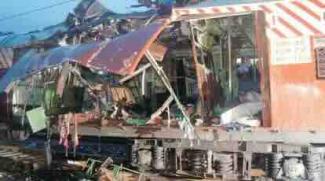Terror Attacks on Railway Network in India
At least 67 people have died, and many sustained burn injuries in the fire triggered by bomb blasts in Delhi- Attari Samjhauta Express on February 18, near Deewana in Panipat in Haryana. The bi-weekly train means 'Understanding,' a symbol of friendship that connects New Delhi to Pakistan's city of Lahore. The attacks took place ahead of Pakistani Foreign Minister Khursheed Kasuri’s visit to New Delhi for talks with his Indian counterpart on Tuesday. Kasuri is scheduled to co-chair the India-Pak Joint Commission in New Delhi. This time, terrorist outfits have been cautious and have yet to claim any responsibility for this dreadful attack. Lashkar-e-Toiba (LeT) and the Student Islamic Movement of India (SIMI) nexus are suspected in this attack.
Terrorist outfits are increasingly targeting railway and transportation systems for their ‘high-density’ character to make a visible and lasting impact. In India, Islamic terror outfits, Left-wing extremists (Naxals or Maoists) and separatist militant groups have been targeting rail networks to inflict maximum human casualties and economic disruption. Unfortunately, despite a history of terror attacks against rail and transit systems around the world (and in fact, large numbers took place in India), it failed to wake the authorities to overhaul the Rail security apparatus. Although closed circuit televisions (CCTV) and metal detectors (largely ineffective when monitored by inefficient personnel) are in place in some important stations, terrorists manage to sneak into the so-called security cordon.
A Timeline of Major Attacks on Railways:
February 18, 2007: At least 67 people were killed and many injured in a terror attack on Delhi -Attari Samjhauta Express.
July 11, 2006: A series of seven bomb blasts on Mumbai trains killed over 200 commuters and left hundreds injured. Lashkar-e-Taiba (LeT) & Students Islamic Movement of India (SIMI) nexus blamed for the synchronized blasts.
March 7, 2006: At least 20 people were killed in twin bombings at a cantonment train station and a temple in the Hindu holy city of Varanasi. LeT/SIMI nexus was behind the blasts.
March 27, 2005: Seven people were killed and several injured when a powerful blast triggered by Maoists ripped through the Ranchi-Asansol Holi Special at Gourinathdham station under the Adra division in West Bengal.
July 28, 2005: Twelve people were killed and 52 others injured in the Shramjeevi Delhi-Patna Express blast. The blast occurred between Jaunpur and Sultanpur stations near Varanasi, Uttar Pradesh. Students Islamic Movement of India (SIMI) was suspected.
October 02, 2004: Over 35 people were killed in separate bombing incidents at the train station and nearby market in Dimapur, Nagaland. Around 15 of them were killed in the Railway station blast.
January 02, 2004: Seven people were killed in a blast at the Jammu railway station perpetrated by Jaish-e-Mohammed terrorists.
March 13, 2003: A bomb blast on a passenger train at Mulund (Mumbai) killed 12 people and injured 70 others.
August 14, 2000: More than nine people were killed and scores injured in a blast in the Muzaffarpur-Ahmedabad Sabarmati Express, near Rauzabad in Uttar Pradesh.
June 22, 1999: Around ten people, including Indian Army personnel, were killed and over 80 others injured when a powerful bomb exploded in West Bengal’s New Jalpaiguri (NJP) railway station. Pakistan’s intelligence agency’s connection was suspected.
July 08, 1997: At least 33 people died in a blast at Lehra Khanna railway station in Bhatinda, Punjab.
December 30, 1996: More than 30 people died in a blast in Brahmaputra Mail between Assam’s Kokrajhar and Fakiragram.
